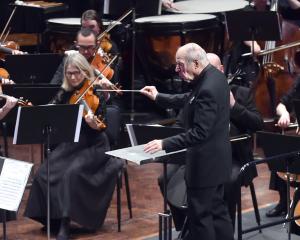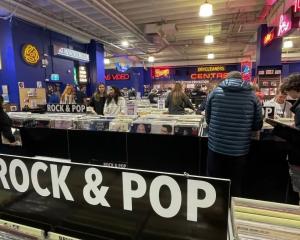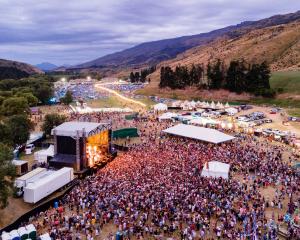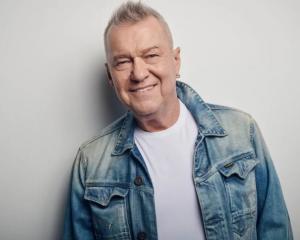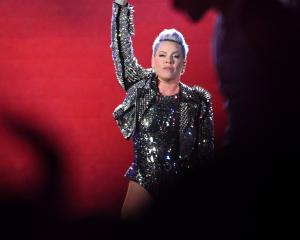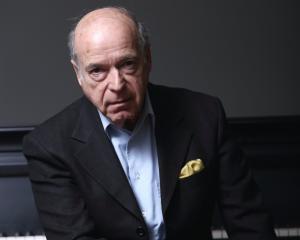Almost 20 years since the Chills' last studio album, another has been completed. It's called Silver Bullets and it puts to rest a few of Martin Phillipps' demons, writes Shane Gilchrist.
It's late on a Friday afternoon in Dunedin.
As various nine to fivers file home to families or begin some other post work ritual, Martin Phillipps, founder and driving force of the Chills, is relaxing at Lower Stuart St venue Taste Merchants, chatting to a friend as fellow Dunedin music veteran Graeme Downes, of the Verlaines, plugs in an electric guitar and tweaks his amplifier's tone controls in preparation for the pair's shared solo performances that night.
''That's quite jazzy,'' says Downes, the writer of songs which, in other hands, could have been jazz.
Indeed, Phillipps almost resembles a jazz head. He's dressed top to toe in black. Then again, he is a musician. From Dunedin. Like the Batman character from the Lego Movie, it seems he only works in black, or very dark grey.
Phillipps is pondering his setlist options, explaining he'll probably sing songs both new and old, including some apparently rare even to him: ''It's been 30 or so years since I played one of them, so the lyrics are a little hard to remember ...''
Three nights later, about 30 people gather at University of Otago venue Re:Fuel.
Family, friends, supporters, they've been invited to a preview of the Chills' new album, Silver Bullets, which will be released late next month. Finally, almost 20 years since the group's last studio album, 1996's Sunburnt, another has been completed.
The lights dim. The album begins. Like a plane's wheels touching down on tarmac, it's the sound of a long awaited journey coming to an end, yet also beginning.
The implications of the opening track's title, Father Time, is not lost on those present.
Featuring bells and choral snatches intended for use in the Chills' 1990 breakthrough album Submarine Bells, the samples were captured by Phillipps' father in the same Albany St studios largely used for the latest release.
A loop closing, then?
Phillipps considers this question the next day as he sips a beer at Taste Merchants while, outside, a warden adds chalk to the tyre of his car, prompting a mutter (''No, no, I paid for a parking ticket ...'') accompanied by a furtive raising of brows.
Beneath, the eyes are pale blue, like the subject of the song by the Velvet Underground, the American band which influenced more than a few of Phillipps' Dunedin peers, even if his studious musical examinations had more to do with the craft of The Beatles, Brian Wilson and Buffalo Springfield, among others.
Back to Father Time ...''It seemed the only place to put it was at the start,'' Phillipps explains.
''Because it has my father's voice, it is an emotive thing. There's no coincidence that it's a rip off of the Beach Boys' Our Prayer, an a cappella song, though theirs is a much more sophisticated vocal work.
''The engineer, Brendan Davies, thought I was being tongue in cheek, but I wasn't. It establishes a kind of tone that at least gets people thinking what the hell is going on.''
It is put to Phillipps that, on initial impressions, Silver Bullets is the sound of a songwriter (and band) playing with ideas both big and small, being adventurous while remaining true to the combination of pop melodicism and layered depth that piqued listeners' interest in the early '80s.
Many of the songs begin as small ideas, often based around a guitar phrase, be it chiming, soaked in reverberation or dark, sinuous and distorted.
As per lead single America Says Hello, released digitally in June, songs often don't end as they start; several are either twisted into different shapes or balloon out as Phillipps and company add idea upon idea.
In short, it's assured songwriting. On initial impressions, it's no stretch to suggest the album is a return to form. Yet Silver Bullets is also a testament to the force and dexterity of the Chills line up number 33.
As Phillipps noted the previous night, the version of the Chills that exists now has been together longer than any of the '80s line ups that might live in some fans' memories.
''This band has stuck with me through some pretty odd times,'' he says, referring to keyboardist turned bass player James Dickson and drummer Todd Knudson, who joined him in 1999, followed by multi instrumentalist Erica Stichbury then keyboardist Oli Wilson.
''I think I relaxed the reins a bit on this record, knowing I was surrounded by quality musicians.''
Again, an interruption to his flow: hasn't Phillipps worked with plenty of talented musicians in the past?
''Of course, those people added their own things to it. And because they helped establish what the Chills are, it was easier for this line up to understand and bring their own expertise to it, and play parts I'd never think of. There was a lot more freedom.
''This album, because of the technology, involves the most severe editing the Chills have ever done.
''Huge chunks of songs would be chopped out and moved around. It's actually quite useful to learn how to let go of your favourite pieces. That happened a few times.''
Phillipps notes the band has thus had to learn how to play the songs as per the album. He has no qualms about this.
''That's probably how it should be. After all, the album will outlive the band as an artefact.''
That brings us back to a key reason for this chat: survival, in various forms.
Phillipps was a 17 year old Logan Park High School pupil when he announced his fledgling band at a gig at Coronation Hall in Maori Hill, Dunedin, in November 1980.
Songs came and soared: Kaleidoscope World, Rolling Moon, Pink Frost, Doledrums, I Love My Leather Jacket.
On the back of support from a range of labels (including Flying Nun, Warners/Slash and London Records), the Chills' music found its way into lounges in the UK, Europe and the US, and was promoted by influential DJs, including late BBC host John Peel.
Submarine Bells and its key single, Heavenly Pop Hit (once described by respected Auckland based music critic Graham Reid as ''such a clever song, constantly ascending and descending''), were a highwater mark, the album reaching No 1 and the single No 2 on the New Zealand charts in 1990.
The same year, the band packed the Dunedin Town Hall.
However, by the time he was penning tracks for 1992 album Soft Bomb, Phillipps' writing had reached a level of sophistication alien to some, whose ears had tuned in to a more immediate, tactile guitar assault, spearheaded by Nirvana's 1991 mega hit Smells Like Teen Spirit.
In assessing Phillipps' career (lack of money notwithstanding, the only other significant job he has held since his teens was a six month stint working for the Salvation Army), the list of hiccups is long: incessant line up changes; the lack of reaction to Soft Bomb; the turmoil of a mid tour band break up in the United States in 1992; being dropped by Warners/Slash; artistic ambitions realised but real commercial success denied ... it's little wonder self belief was more than bruised.
The same could be said for Phillipps' body.
''It's been amazing just how many people are thrilled that I have come through what I've been through, the depression, the drugs.''
He says this with neither glibness nor self pity. The facts remain: Phillipps contracted hepatitis C in the mid '90s through his use of opiates. The disease has now morphed into stage four liver disease.
''I shouldn't be drinking at all,'' the 52 year old says before raising glass to mouth.
''There was a trial for a new hep C drug, which does actually cure it, but there was confusion. The particular group I was in was meant to have done the interferon treatment.
''I had, but my interferon was the one type - they found out later - that ruled me ineligible. And obviously, there is caution over who they give these things to.
''Also, I was still drinking, which was a risk factor. The chances of me getting a liver transplant are very remote because I'm over 50 and I have no dependants.
''I am eating better than I was and generally taking care of myself better. But the serious damage has been done.
''If I can get on this new drug that would be great. It won't cure my liver disease but it will at least prevent further damage.
''I'd be surprised if I see 60. I think things are going to happen pretty quickly when they do. The liver is one organ that's not meant to exhibit pain, unless it's bad. And I get liver pains.
''And now I have a new girlfriend for the first time in 10 years ...'' Phillipps says, pausing to let the irony bite deeper.
''I met her in England last year. She lives there, so that's obviously problematic, too. But it's a good reason to try to pull myself together better.''
Ever the lyricist, Phillipps uses his record collection as a metaphor for his experiences.
''The fact I went through all this and managed to keep my record collection intact ...'' he trails off. The inference is clear: not all of the people with whom he was mixing could be deemed friends.''
Being the kind of person who grew up listening to Lou Reed and stuff, the idea of rubbing shoulders with these underground characters was quite romantic at first.
But then you start realising a lot of these people are just sleazy bastards and they're eyeing up your property.''
He also recalls being shown off as some sort of trophy.
''Someone would bring a guy straight out of prison to my house and say, 'this is Martin Phillipps. You know, I Love My Leather Jacket?'.''
So more like, step you out for your leather jacket?
''Exactly. It got pretty dodgy.
''Still, there were some really neat people. I had some wonderful times. Frankly, there's nothing quite so nice as sitting around a Conray heater with a bunch of people who are into the same music as you, all having taken drugs.
''But I do regret the amount of time that goes by when you do that sort of stuff. I've lost days, weeks, if not years. A decade I think.
''At the same time, I didn't stop making music completely. So, yeah, not a complete write off.
''In the years before manager Scott Muir got involved (in 2001), I was trying to run what should have been an international career from Dunedin, getting little gigs and being ripped off, not really getting anywhere.
''It felt like everything I did was just treading water and the Chills were being treated as some sort of sad remnant of a band that had had some special moments.
''Bryan Spittle [of Mink] was one who really pushed me to do both the Sketch Book home demo release (1999) and the Secret Box official bootleg (2001).''
Those projects were relatively small. For example, Secret Box: Chills Rarities 1980-2000 was a limited edition release available via the Chills website. Yet such activity, however modest, was at least a step forward.
''There were enough people who cared,'' Phillips says, adding Neil Finn was another who helped through the dark times.
''He was very disturbed about my drug use, but he would always front up and be encouraging.
''Of course, my family was always there. Ultimately, I felt I would let down too many people if I just gave up and went right off the rails.''
As he sips his beer, reflecting on events old and new, Phillipps also contemplates his immediate future. He has a day left - ''to buy undies and other stuff'' - before he flies to England, where he will join his girlfriend. (By the time you read this he'll be there.)
He plans to be there until late October, returning to Dunedin a week or so before Silver Bullets goes public.
Having secured a licensing deal with Far South Records, United Kingdom based Fire Records will release the album worldwide on October 30, although Flying Nun will distribute it in New Zealand via its Flying Out offshoot, reflecting a connection first established in the label's seminal 1981 Dunedin Double, on which the Chills were joined by the Verlaines, the Stones and Sneaky Feelings.
''We're not sure what's going to happen,'' Phillipps says.
''I'm not expecting any money back from this album.''
He says there will ''definitely'' be New Zealand and Australian gigs later this year and into next.
Indeed, late last week it was confirmed the Chills will support psych rock outfit Brian Jonestown Massacre at Sammy's, Dunedin, on November 7, a night that will double as the band's local album launch.
Phillipps and company are also on the bill for the McLaren Music and Arts Festival near Tauranga early next year.
''There are some clubs around 500 capacity in Europe and the States that are keen to have us, but we need to get two or three festivals to make it worthwhile,'' Phillipps says.
''I'm also doing a couple of solo shows while I'm in England. One is public; the other is a private gig for a 'super fan' who wants me to play at his barbecue.
''I think with this album there is a general sigh of relief. I'm pleased there is interest in what we are doing and I'm looking forward to being able to talk about this.''
A relatively shy person, certainly not one to brag, Phillipps confesses he had to work on his ability to deal with the media in his younger days. Given he's likely to field more than a few interviews in forthcoming weeks, he says he is ''relearning'' some of those skills.
Yet he is more confident now. He's not worried about impressing journalists. And if Silver Bullets doesn't kill a few doubts, he thinks age might garner him just a little more respect.
''They might not know that much about me but they know I'm an old bastard.
''At the same time, it can be a bit of a chore, especially if you have, say, 16 interviews in one day, which has happened. That does get tedious, particularly when you are answering the same questions.''
He adopts an east European accent: ''So the Chills have had many line up changes? Are you a difficult person?''
(Quick mental note: this line of inquiry might need a little massaging. Here goes ...)
Is there a flipside to the single minded determination that took Phillipps from dank Dunedin practice rooms to critical respect and recognition within New Zealand and overseas?
Have those very same traits required some modification over the years? Is he, erhm, less difficult than he reportedly was?
Phillipps barely pauses: ''It took me a long time to realise I am genuinely an odd person.
''It isn't a put on or an affectation. I do think about things a bit differently from other people.
''The way I live my life - or at least aspects of it - is still quite child like. But other aspects are really worldly.
''It's this weird mixture - and I think that comes across in the music.''
The Chills: fact file
• Formed by Martin Phillipps in 1980,
• The Chills played their first gig in November that year at Coronation Hall, Maori Hill, Dunedin.
• Despite lasting more than three decades (through various line up changes), the number of studio albums (not compilations or EPs) released by the group is relatively few, comprising Brave Words (1987), Submarine Bells (1990), Soft Bomb (1992), Sunburnt (1996) and, come October 30, Silver Bullets.
• For a complete discography of The Chills, visit: www.softbomb.com.
The music
• The Chills' Silver Bullets is released on October 30. An extensive, track by track preview of the album will appear in The Weekend Mix next month.
• The Chills perform with Brian Jonestown Massacre at Sammy's, Dunedin, on November 7.



